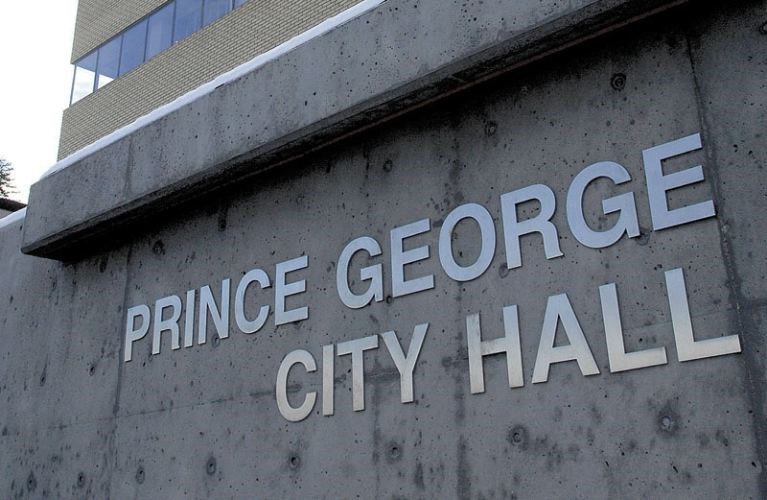More policing and bylaw enforcement; fines or other penalties for owner/operators of harm reduction providers who fail to clean up discarded drug needles near their properties; and increased lighting of parking structures, alleyways and streets highlight a list of policy and enforcement requests a group of Prince George business owners submitted to city council Monday night.
Speaking on behalf of more than 1,200 city businesses and property owners, the group which represents the Prince George Chamber of Commerce, Downtown Prince George and the Gateway Business Improvement Association recommends the city hire six additional RCMP officers and two support staff to enhance public safety, especially in the city’s downtown core.
In his presentation, Chamber of Commerce CEO Todd Corrigall requested mayor and council defer other spending to cover the cost of the additional staffing, an estimated $1.8 million annually, without increasing taxes. To cover the cost of those salaries, Corrigall said the city should consider stepping up bylaw enforcement as well as create new bylaws and collect from those caught breaking those laws. He pointed to facility sponsorships to secure naming rights to public buildings and as part of those deals include community giving grants as a new revenue source for the city.
“This can’t be taxation story, this has to be story of how we mitigate expenses for the benefit of our community,” said Corrigall. “One of the pillars of Municipal Government Act is community safety and we really want that focus to come forward through the budgeting process in January.”
Mayor Lyn Hall agrees more policing would help alleviate some safety concerns but said he doubts council could achieve enough budget savings to make that possible.
“We talked about the budget today and about two weeks ago in finance and audit meetings and it’s difficult for us to increase policing to take a look at those enhancements without raising taxes,” said Hall. “We need to have a conversation with the (RCMP) superintendent. He’s the one who manages the force and he knows how to put those boots on the ground.”
The policy and enforcement requests for 2020 stem from discussions with business owners at a Nov. 12 information session the Chamber hosted in response to increased concerns about the societal problems plaguing downtown and other city locations.
“This is not a downtown or Gateway issue, this is a community issue,” said Corrigall. “We really want that lens to change. Spruceland experiences issues, the Hart experiences issues.
“The core of this is community safety. Whether you’re talking addictions, you’re talking mental health or talking property crimes, that’s how this is a community issue.”
The Chamber committee recommends that city staff work with community stakeholders and the RCMP to develop an integrated public safety and enforcement team tasked with creating more inviting and safe public spaces to help attract people.
The group suggested there are opportunities to work with BC Hydro and Clean BC as partners on enhanced lighting projects, prompting Coun. Brian Skakun to mention the City of Vernon recently gave its downtown businesses $27,000 to install surveillance cameras in its downtown area as a means to deter crime. Skakun said the city will have an opportunity to come up with its own creative solutions to its societal problems with the Mayor’s Task Force, to be formed in January.
The downtown committee also recommends the city petition the provincial government and Northern Health to develop substance abuse treatment facilities and sobering centres in Prince George to better serve at-risk individuals now required to travel to the Lower Mainland, away from friends and family, to access their treatment. The group encouraged the city to continue working with BC Housing and the province to develop affordable housing and provide employment options for at-risk people who now maintain a visible presence on city streets. Corrigall praised council for its community housing initiative planned for First Avenue, calling it “a great first step.”
The downtown alliance wants the city to act as an advocate to advance proposals for provincial and federal support for projects to benefit business and property owners.
The provincial government and Northern Health were also targeted by the committee in its list of policy and enforcement requests, one of which suggested the Ministry of Children and Family Development release under-ultilized property at the Prince George Youth Custody Centre to BC Housing to create additional bed space, short-term sobering centres and long-term addictions counselling and recovery services. The Chamber alliance wants the province to mandate Northern Health to require drug paraphernalia used in harm reduction strategies to be labeled with identifiable markings to hold agencies accountable for recovery and disposal of materials provided to drug users.
Changes to the justice system were also recommended by the committee to modernize the sentencing practice for prolific offenders and consider alternate sentencing structures which take inti account rural and remote populations. It highly recommends restorative justice to encourage accountability for convicted offenders.
While downtown social issues have been a prominent focus of council proceedings the past couple months, Downtown Prince George president Eoin Foley says the problems facing business owners like himself are the product of years of failing to address the root causes of substance abuse, homelessness and poverty which lead to crime.
“It’s been simmering for a long time,” said Foley. “There’s been some recent activity that‘s sparked a fire into the equation to start putting some meaningful policy changes together.
“This has been building for probably decades and we’re finally reaching a boiling point where there seems to be a consternation of many different communities that are absolutely fed up with trying to deal with crime and disorder in our communities. The time to address these issues was 20 years ago. Now, actually fixing the problems instead of preventing them from being created is a lot harder.”



.png;w=120;h=80;mode=crop)